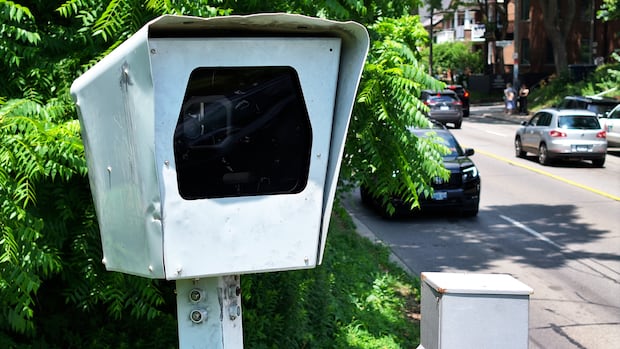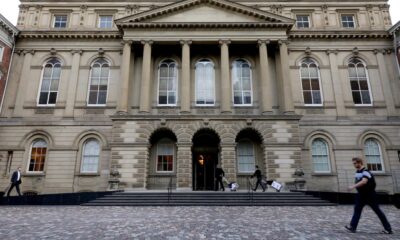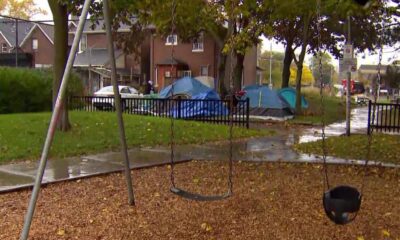Top Stories
Toronto Faces Urgent Layoffs as Ontario Bans Speed Cameras

URGENT UPDATE: Toronto Mayor Olivia Chow announced today that the city will lay off approximately 1,000 workers following the Ontario government’s ban on speed cameras across the province. This sudden decision comes as a significant setback for the municipality, which relied on revenue from speed enforcement to fund crucial public safety positions.
In a press conference earlier today, Chow stated, “That funding is now gone as of today,” referring to the $31.2 million used to cover the costs of 911 crossing guards and $3.9 million for 18 traffic safety police officers. The ramifications of this ban are immediate and severe, posing a threat to public safety and local employment.
Toronto city council voted unanimously on September 28, 2025, to urge the provincial government to reimburse the city for the operating costs previously funded by speed camera revenue. The motion emphasized the importance of maintaining vital safety programs that protect residents.
Chow criticized the Ontario government’s approach, stating, “It felt like a make-work project. Install the cameras. Okay, a few years later, get rid of the cameras.” The mayor’s concerns reflect a troubling cycle of employment instability, with her warning that 1,000 people may lose their jobs as a direct consequence of the ban.
The city collected $30,375,060 in fines from speed camera tickets issued between January 1 and August 31, 2025, from a total of 150 speed cameras operating across Toronto. The revenue lost due to this ban leaves the city facing a budget shortfall of $40 million to $50 million annually, according to Chow.
In response to the speed camera ban, the Ontario government announced a $210 million Road Safety Initiatives Fund aimed at improving safety in school zones and community safety zones without utilizing speed cameras. This funding is intended for traffic-calming measures such as speed bumps, raised crosswalks, and enhanced police enforcement. However, Chow deemed the fund “insufficient” for the city’s needs.
“We hope we can get a portion of it. Is it enough? Nowhere near enough,” Chow stated, highlighting the financial strain the city will face.
Ontario Transportation Minister Prabmeet Sarkaria defended the province’s decision, asserting that speed cameras were not intended as tools for revenue generation. In an interview with CBC News, Sarkaria remarked, “Originally, the city of Toronto came out saying this is a revenue-neutral program. Today, they’re showing it’s not.”
As Toronto prepares to remove speed cameras, the city will install signs indicating upcoming school zones, as mandated by provincial legislation. The future of public safety in Toronto hangs in the balance as officials grapple with the implications of this sudden policy shift.
Next steps include the city’s appeal for reimbursement from the province, requesting $95.8 million for local safety improvements and an additional $40.6 million for traffic lights and other safety measures, totaling $210 million that may help offset the lost speed camera revenue.
As developments unfold, the urgency to address public safety and the livelihoods of 1,000 workers has never been more critical. Toronto residents and officials alike are left to ponder the future of their city’s safety and the economic impact of these drastic changes.
-

 Politics1 week ago
Politics1 week agoSecwepemc First Nation Seeks Aboriginal Title Over Kamloops Area
-

 World4 months ago
World4 months agoScientists Unearth Ancient Antarctic Ice to Unlock Climate Secrets
-

 Entertainment4 months ago
Entertainment4 months agoTrump and McCormick to Announce $70 Billion Energy Investments
-

 Lifestyle4 months ago
Lifestyle4 months agoTransLink Launches Food Truck Program to Boost Revenue in Vancouver
-

 Science4 months ago
Science4 months agoFour Astronauts Return to Earth After International Space Station Mission
-

 Technology3 months ago
Technology3 months agoApple Notes Enhances Functionality with Markdown Support in macOS 26
-

 Top Stories1 month ago
Top Stories1 month agoUrgent Update: Fatal Crash on Highway 99 Claims Life of Pitt Meadows Man
-

 Sports4 months ago
Sports4 months agoSearch Underway for Missing Hunter Amid Hokkaido Bear Emergency
-

 Politics3 months ago
Politics3 months agoUkrainian Tennis Star Elina Svitolina Faces Death Threats Online
-

 Politics4 months ago
Politics4 months agoCarney Engages First Nations Leaders at Development Law Summit
-

 Technology4 months ago
Technology4 months agoFrosthaven Launches Early Access on July 31, 2025
-

 Top Stories3 weeks ago
Top Stories3 weeks agoFamily Remembers Beverley Rowbotham 25 Years After Murder




















